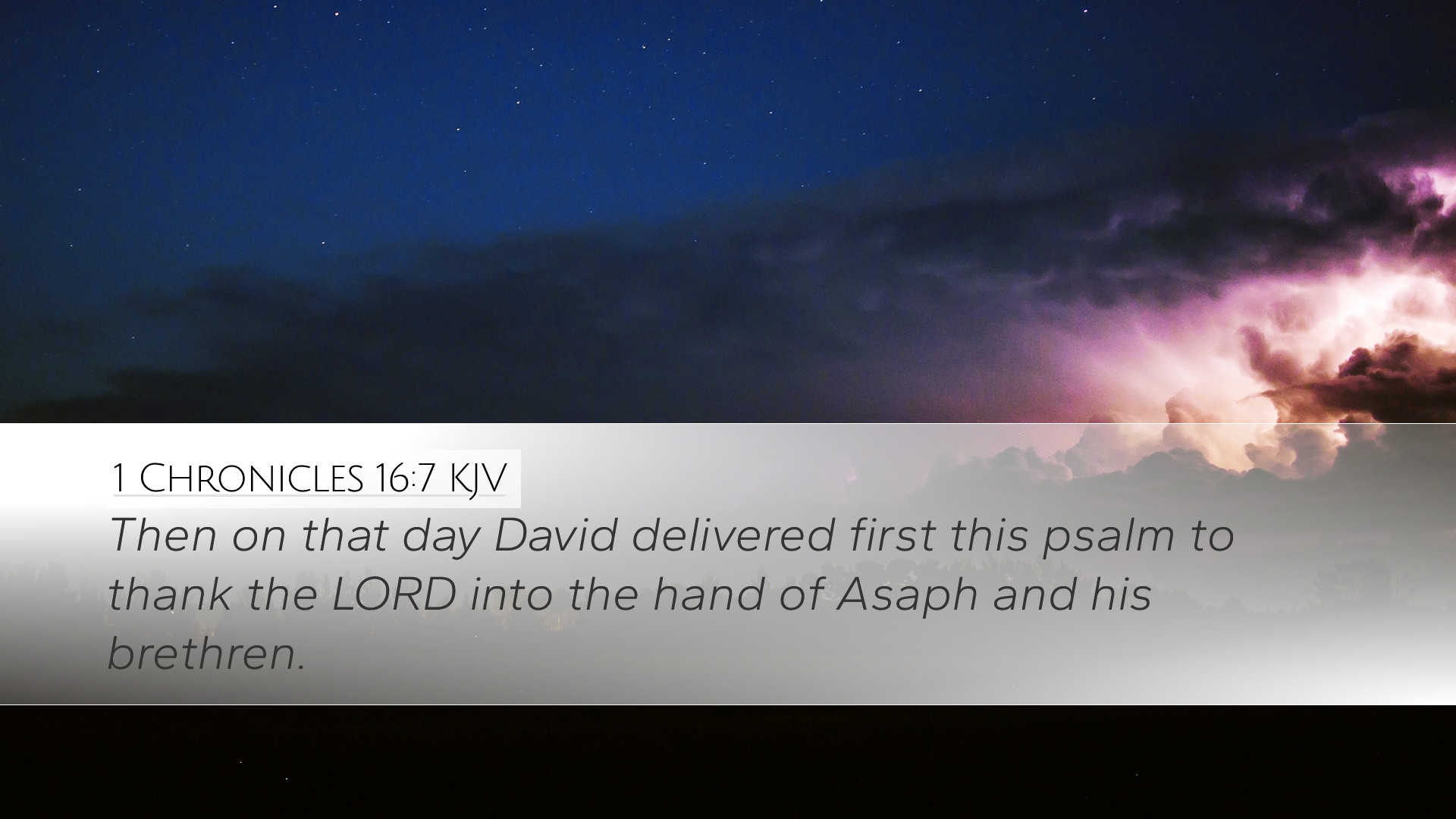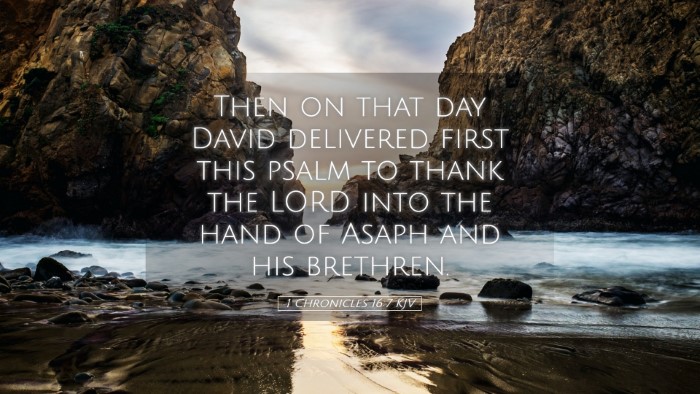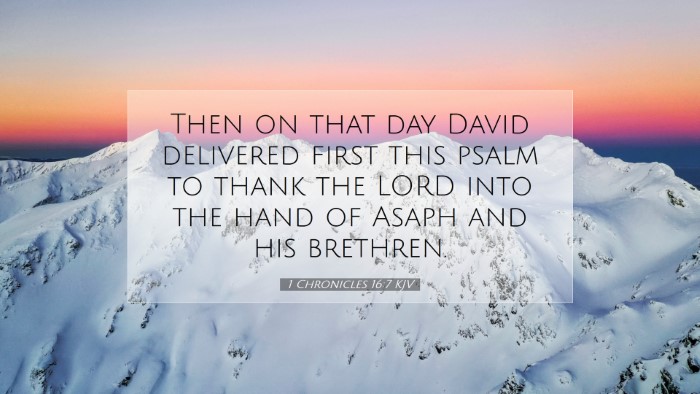Commentary on 1 Chronicles 16:7
Verse: "Then on that day David delivered first this psalm to thank the LORD into the hand of Asaph and his brethren." (1 Chronicles 16:7)
Introduction
This significant verse marks a pivotal moment in the history of Israel, reflecting both the celebratory nature of David's reign and the importance of worship in the life of God's covenant people. It introduces a psalm that was meant to commemorate the return of the Ark of the Covenant and highlights the role of Asaph in leading the people in thankful worship.
Context and Background
1 Chronicles 16 captures the moment when King David brings the Ark of the Covenant to Jerusalem, symbolizing God's presence among His people. The entire chapter is a rich tapestry of worship expression, as it includes David's exhortation and the psalm itself. This context is essential for understanding the weight and significance of David’s actions, as well as the psalm's content.
Historical Significance
The Ark's return is a fulfillment of God’s promise and a sign of His faithfulness. David's initiative to express thanks reflects an understanding of history not just as a series of events but as a narrative woven by divine purpose.
Analysis of the Verse
This verse introduces the act of David delivering a specific psalm, emphasizing the necessity and practice of worship in the community of faith. The act of delivering the psalm indicates:
- Intentional Worship: David is not merely reacting to an event but is actively choosing to engage the people in thankfulness. This sets a model for structured worship, combining both personal and communal elements.
- Leadership in Worship: By assigning the responsibility to Asaph, David recognizes the importance of leadership within worship. This act demonstrates the need for order, reverence, and the right heart attitude in corporate worship settings.
- Continuity of Tradition: The mention of Asaph and his brethren creates a link to future generations, highlighting a legacy of worship that extends beyond David's own reign.
Theological Insights
This verse invites us to reflect on numerous theological themes:
- God’s Sovereignty: David’s actions emphasize the belief in God's active involvement in the affairs of men and His providential care for the nation of Israel.
- Importance of Thanksgiving: The psalm is fundamentally a declaration of thanks, guiding believers to consider thanksgiving as a central aspect of their relationship with God. Gratitude is both an attitude and a practice that shapes communal identity.
- Corporate Identity: The gathering of the people to worship with this psalm signifies unity under God's covenant. This forms a model for present-day believers, demonstrating the importance of shared worship experiences.
Commentary Insights
Matthew Henry’s Perspective
Matthew Henry emphasizes the importance of thanksgiving and recounting God's gracious deeds in the lives of His people. He highlights that David's act of delivering the psalm was not only a moment of personal worship but a communal declaration of God’s faithfulness. Henry encourages contemporary believers to adopt a posture of gratitude and to recognize the historical and spiritual context of their worship.
Albert Barnes’ View
Albert Barnes comments on the significance of Asaph as a leader in worship, which points to the broader implications of worship leadership within the church. He posits that this moment illustrates the need for both planned and spontaneous expressions of worship, whereby leaders help shape the community's understanding of God’s past actions and attributes. Barnes also suggests that the structure of worship as seen here sets a precedent for later worship practices.
Adam Clarke’s Interpretation
Adam Clarke notes the impact of this psalm as a tool for remembrance and celebration. He underscores the idea that this psalm constructed by David incorporates both historical events and theological truths, serving as a reminder of Israel’s unique relationship with God. Clarke encourages readers to reflect on their own acts of remembrance in worship, regarding how communal worship can instill a sense of identity and belonging within the faith community.
Practical Applications
Drawing from the insights gathered, several practical applications emerge for today’s church:
- Fostering Thanksgiving: Church leaders should intentionally cultivate an atmosphere of gratitude within worship, encouraging congregations to recount God's goodness and faithfulness.
- Emphasizing Leadership: Understanding the role of worship leaders is crucial. Training and supporting individuals who facilitate worship can help ground communities in Scripture and history.
- Cultivating Tradition: The life of the church should reflect a continuity of worship practices, incorporating both ancient texts and contemporary expressions of faith, creating a holistic community identity.
Conclusion
1 Chronicles 16:7 is a profound reflection of David’s priorities as a leader and a worshiper. The verse serves as a challenge and an inspiration for believers to develop a culture of thankfulness, recognize the importance of worship leadership, and continue to weave their narrative into the larger story of God’s redemption. As we meditate on this verse, may we strive to embody the spirit of worship that David initiated, always seeking to glorify God with our lives.


